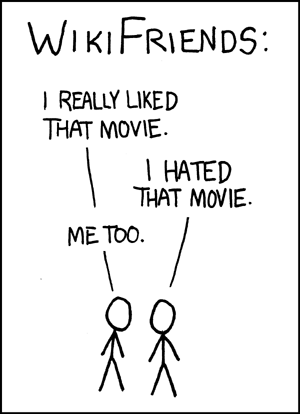Difference between revisions of "185: Wikifriends"
(→Explanation) |
(Spelling fix) |
||
| Line 12: | Line 12: | ||
In the comic, this phenomenon is linked to the habit of adapting one's own opinions to those professed by friends. The influence of social environment is called {{w|peer pressure}}, often with a negative connotation. The term "Wikifriends" is coined in the comic as a label for people who adjust their views in order to incorporate into a group. As an example, the comic shows a discussion about a movie in which one collocutor entirely veers in his opinion when he hears what his friend thinks. | In the comic, this phenomenon is linked to the habit of adapting one's own opinions to those professed by friends. The influence of social environment is called {{w|peer pressure}}, often with a negative connotation. The term "Wikifriends" is coined in the comic as a label for people who adjust their views in order to incorporate into a group. As an example, the comic shows a discussion about a movie in which one collocutor entirely veers in his opinion when he hears what his friend thinks. | ||
| − | Wikipedia was often advertised as "the encyclopedia that anyone can edit", thus wikifriends could be seen as "the friends that anyone can edit", in other words: They will be influenced by your | + | Wikipedia was often advertised as "the encyclopedia that anyone can edit", thus wikifriends could be seen as "the friends that anyone can edit", in other words: They will be influenced by your opinion rather than having one of their own. |
The title text suggests that [[Randall]] also observes himself to be frequently influenced by others. | The title text suggests that [[Randall]] also observes himself to be frequently influenced by others. | ||
Revision as of 08:17, 24 April 2014
| Wikifriends |
 Title text: It's crazy how much my gut opinion of a movie/song is swayed by what other people say, regardless of how I felt coming out of the theater. |
Explanation
The comic's title refers to the well-known online encyclopaedia Wikipedia. Since it has been started, the project has become the de-facto authority for facts and opinions in all sorts of fields (at least for non-professionals). Many people tend to readily accept any statement as true just because it was mentioned in a Wikipedia article.
In the comic, this phenomenon is linked to the habit of adapting one's own opinions to those professed by friends. The influence of social environment is called peer pressure, often with a negative connotation. The term "Wikifriends" is coined in the comic as a label for people who adjust their views in order to incorporate into a group. As an example, the comic shows a discussion about a movie in which one collocutor entirely veers in his opinion when he hears what his friend thinks.
Wikipedia was often advertised as "the encyclopedia that anyone can edit", thus wikifriends could be seen as "the friends that anyone can edit", in other words: They will be influenced by your opinion rather than having one of their own.
The title text suggests that Randall also observes himself to be frequently influenced by others.
Transcript
- WikiFriends:
- [Two people are talking to each other.]
- Cueball: I really liked that movie.
- Friend: I hated that movie.
- Cueball: Me too.
Discussion
I thought this was a reference to the WikiFriends group who defend WikiLeaks. I figured it was about intimidation. 184.66.160.91 02:52, 27 August 2013 (UTC)
That's impossible. The comic came out before Wikileaks even existed.120.148.234.14 22:01, 19 October 2013 (UTC)
- Actually, Wikileaks launched a month before the comic's publication date, if the above is accurate. Surely you guys remember them leaking the Bush administration's war crimes within the next year or so. —Kazvorpal (talk) 20:20, 6 October 2019 (UTC)
I have a completely different understanding of this comic than what's in the explanation here. Wiki is a site where anyone can change content and it's instantly visible - I think Randall meant that wikifriends are wiki because anyone can change their opinion on movies because they instantly adapt what others say. 141.101.89.217 14:52, 3 September 2014 (UTC)
To me wikifriends were the kind of people that never start a edit war with you: Many scientists that add original research to Wikipedia immediately get followed by Wikipedia s that "have a different opinion here". Several of my friends stopped contributing to Wikipedia after such incidences and they say it is one of the factors that limits Wikipedia 's growth.--Gunterkoenigsmann (talk) 18:24, 17 June 2022 (UTC)
Man, I thought I was the only one. I had no idea that other people experienced the same thing that I do; guess it's nice to see that I'm not alone in this boat. Thankfully, I've noticed the effect is reversible; I listened to a review of Demondice's discography in which the reviewer paused every 5 seconds to ridicule the music; in addition, my friend was nearby lambasting it all the time too. Naturally, I thought it was horrible. But when I gave it a chance on its own, with no friends around or a reviewer muttering obscenities in my ear, it really didn't sound as bad as they made it out to be. Pie Guy (talk) 08:23, 4 February 2024
